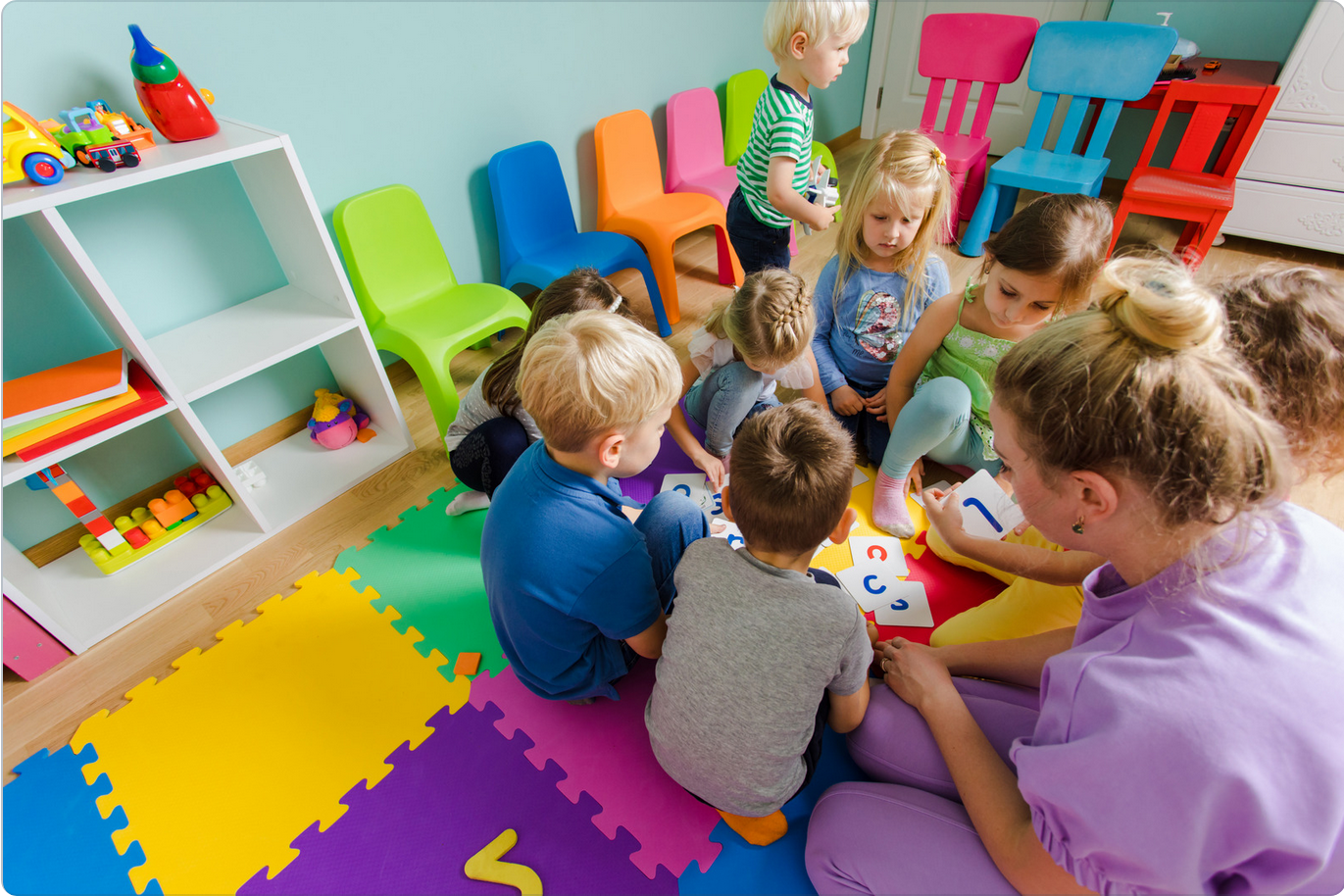Preschool and daycare are both early childhood education programs that serve children before they begin formal schooling.
However, there are some key differences when it comes to Preschool v/s Daycare.
Preschool programs typically serve children between the ages of 3 and 5, and focus on providing education that prepares them for kindergarten and beyond.
Preschools typically follow a structured curriculum that includes learning basic skills such as letters, numbers, colors, and shapes, as well as social and emotional development.
Daycare, on the other hand, is generally more focused on providing care for children while their parents are at work or otherwise unavailable.
Daycare centers often serve children from infancy through preschool age, and may offer more flexible hours than preschool programs.
Related
How Long is a Preschool Day?
Are Preschool Teachers Exempt Employees?

Preschool Programs
Age range and curriculum:
Preschool programs generally serve children who are at least 3 years old, and may have specific age requirements based on local regulations or program policies.
The curriculum is typically designed to help children develop key skills such as letter and number recognition, basic math concepts, and early literacy skills.
Preschools may also offer opportunities for children to explore science, art, music, and other subjects.
Learning goals and outcomes:
The primary goal of preschool is to help children develop the skills they will need to succeed in kindergarten and beyond. This includes not only academic skills, but also social and emotional skills such as self-regulation, empathy, and teamwork.
Preschool programs typically have specific learning outcomes that they aim to achieve, such as helping children develop language and communication skills, fostering a love of learning, and building confidence and independence.
Teaching methods and philosophy:
Preschool programs may use a variety of teaching methods to support children’s learning, including hands-on activities, group projects, and individualized instruction.
Many preschools follow a play-based approach to learning, in which children are encouraged to explore, experiment, and learn through play. Other programs may be more structured, with specific lesson plans and activities designed to meet learning objectives.
The overall philosophy of the preschool program will depend on the specific program and its goals and values.
Related: Why is Preschool Important?
Daycare Programs
Age range and services offered:
Daycare centers may serve children as young as 6 weeks old, and may have specific age requirements based on local regulations or program policies.
Services offered by daycare centers typically include child care, including feeding, diapering, and napping, as well as play and socialization opportunities.
Some daycare centers may also offer educational activities, such as reading and circle time, to support children’s development.
Focus on child care and development:
The primary focus of daycare centers is on providing high-quality care for children in a safe and nurturing environment.
This includes meeting children’s basic needs, such as feeding and diapering, as well as supporting their cognitive, social, and emotional development.
Daycare centers may offer a range of activities designed to promote children’s learning and development, such as music and movement classes, art projects, and outdoor play.
Staff qualifications and ratios:
Daycare centers are typically staffed by qualified professionals who have training and experience working with young children.
Staff may include teachers, caregivers, and assistants who work together to provide a supportive and engaging environment for children.
In most states, daycare centers are required to meet specific staff-to-child ratios based on the age of the children in care. These ratios are designed to ensure that children receive the individual attention and care they need to thrive.
Cost of Preschool vs Daycare
The cost of preschool and daycare can vary significantly depending on a variety of factors, including location, the age of the child, and the specific program or center.
However, in general, preschool tends to be more expensive than daycare due to its educational focus and structured curriculum.
According to a report from the National Association of Child Care Resource and Referral Agencies, the average cost of full-time daycare for an infant in a center-based program is $9,589 per year, while the average cost of full-time care for a four-year-old is $8,320 per year.
In comparison, the average cost of preschool can range from $4,000 to $13,000 per year, depending on location and program.
For example, in the San Francisco Bay Area, the average cost of preschool ranges from $7,300 to $22,000 per year, according to data from Winnie, a child care search platform.
In New York City, the average cost of preschool ranges from $9,000 to $23,000 per year, according to data from Niche, a school rating and review website.
The higher cost of preschool can be attributed to its educational focus and structured curriculum.
Preschool programs typically employ certified teachers and may have a lower staff-to-child ratio than daycare centers, which can increase the cost of the program.
Additionally, preschool programs often require additional resources, such as educational materials and equipment, which can also contribute to the overall cost.
Related: How Much is Daycare for an infant per Week
Related: How much does Pre-K cost?
Teacher Qualifications
Another key difference between preschool and daycare is the qualifications of the teachers.
Preschool teachers are typically required to have a higher level of education and training in early childhood education, as they are responsible for preparing children for their academic journey ahead.
This means that preschool teachers are typically more experienced and qualified to provide children with the best possible learning experience.
Daycare workers, on the other hand, may have varying levels of education and experience, but they are typically not required to have the same level of qualifications as preschool teachers.
While many daycare workers are highly trained and experienced in caring for children, they may not have the same level of expertise in early childhood education as preschool teachers.
Related: What are the Requirements to be a Preschool Teacher
Which is Right for Your Child?
The choice between preschool and daycare ultimately depends on your individual needs and goals for your child’s early education and care.
If you are looking for a more structured and academic-focused environment, preschool may be the right choice.
However, if you need extended hours and a lower cost option, daycare may be a better choice.
Conclusion
In conclusion, preschool and daycare are both popular options for early childhood education and care, but they differ in terms of curriculum, teacher qualifications, cost, and hours.
When choosing between the two, it’s important to consider your individual needs and goals for your child’s education, as well as the learning environment and qualifications of the teachers.
By taking the time to research and visit facilities, you can make an informed decision that is best for your child and your family.
References
- Barnett, W. S. (2002). Cost-effective preschool education. The Future of Children, 12(2), 117-142. This article examines the cost-effectiveness of preschool education and provides evidence that high-quality preschool programs can have long-term benefits that outweigh their initial costs.
- Love, J. M., Haight, W. L., & Williams, K. (2003). Cost, quality, and child outcomes in child care centers: Key findings and recommendations. Child Development, 74(5), 1185-1203. This study examines the relationship between child care center costs, quality, and child outcomes, and suggests that higher-quality centers may be more expensive but can provide better outcomes for children.


